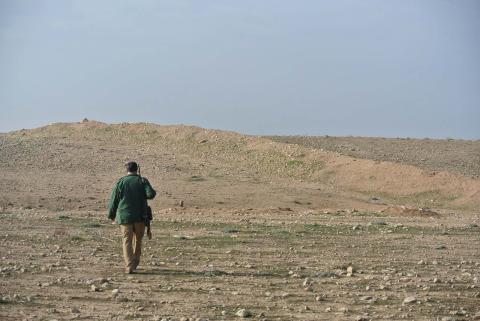The Islamic State in Iraq and Syria (ISIS) has turned from a state of strength, expansion, and influence to a position of fragility, weakness, and retreat. As the Iraqi forces encircle Mosul, ISIS’s last stronghold in Iraq, the Syrian Democratic Forces (SDF) have announced the launching of an offensive aimed at recapturing ISIS’s capital and stronghold of Raqqa.
The Islamic State has become a rapidly diminishing force in both Syria and Iraq. In Iraq, ISIS has lost most of its territory to Baghdad’s central security forces and their allied sectarian militias. In Syria, ISIS has been on the retreat in Aleppo shortly after losing most of its controlled territory in Northern Raqqa province to the SDF in 2015. The recent announcement by the SDF comes in conjunction with the campaign in Mosul and it is timed to put pressure on ISIS fighters and leadership to cut their possible escape towards Raqqa from Mosul.
However, this is not expected to be an easy fought battle for ISIS’s enemies. ISIS has been fighting furiously in Mosul, a battle the group anticipated and prepared very well to fight. Similarly, SDF’s path to Raqqa is expected to be costly, long, and possibly hindered by ethnic, sectarian, or tribal concerns. There are several issues that will determine the success of this offensive, of which three are most relevant.
The first pertains to the lack of coordination with Turkey prior to launching this offensive. Syrian rebels with active Turkish backing have managed to liberate vast areas from ISIS’s control during operation Euphrates Shield. They are poised to capture the last stronghold of ISIS in Aleppo of Al-Bab. Turkey has repeatedly expressed interest in playing an active role in liberating Raqqa, but the unilateral announcement from the US-backed SDF could potentially hinder the success of a collective battle against ISIS in Raqqa and broader Syria.
The SDF, a force mostly equipped with small arms and an assortment of locally built armoured vehicles, might find this battle to be significantly more challenging than its successful campaign to liberate most of the Kurdish regions in northern Syria in 2015. Additionally, the SDF is a force that is largely built of the People’s Protection Units (YPG), a militia that Turkey considers as part of the Kurdistan Workers’ Party (PKK), which Turkey views as a terrorist organisation. This further complicates the potential for a thoroughly coordinated campaign.
The lack of coordination extends to the Iraqi side. ISIS has managed to create strong tribal connections with the inhabitants of the Syrian and Iraqi border areas. ISIS has effectively erased the border between Iraq and Syria, granting thousands freedom of movement and trade after decades of impoverishment and marginalisation by their respective central governments. Hence the full coordination between the Raqqa and Mosul offensives is essential for limiting the movement of supplies, fighters, and ISIS leadership through these tribal areas.
The second issue is the potential for provoking ethnic Arab-Kurdish tensions. Despite being largely suppressed over the course of the Syrian civil war, Arab-Kurdish ethnic tensions could provide an additional dimension for a fuelling conflict. Raqqa and its surrounding villages are predominantly Arab Sunni, and a Kurdish advance towards the city has raised serious concerns by Arab and Sunni leaders. More notably, Turkey has voiced its concerns with the Kurdish forces moving south deep in a traditionally Arab Sunni area. This is enforced by rising concerns of ethnic cleansing against Arab Sunnis in areas controlled by Kurdish forces in Syria or in Iraq. Although the United States, in an attempt to offset these concerns, has announced that Arab forces will lead the fight to recapture Raqqa, the SDF is a Kurdish centric movement that will be perceived by the local Arab residents with suspicion and hostility.
Thirdly, unlike Mosul, which will be governed by the Iraqi State after its liberation, Syria doesn’t have a functioning central government that could take back control of Raqqa after the defeat of ISIS. US officials have suggested a system of local governance will be established and outside forces would then withdraw. But unlike Manbij and Kobani, where this strategy has been implemented, Raqqa is a much larger city, and its Arab majority residents wouldn’t welcome being integrated into the Kurdish governance system in Northern Syria. Alternatively, there has been speculation that Turkey and the US will develop a governance plan for Raqqa involving Arab Sunni elements. The ambiguity surrounding the future of governance in a post-ISIS Raqqa is another indication of the complexity of this offensive.
The many local and foreign forces opposing ISIS face the challenge of coordinating their efforts during and after the liberation of Raqqa. The question is whether these forces can set their differences aside to tackle the threat of ISIS.
Photo by Stringer/Anadolu Agency/Getty Images

